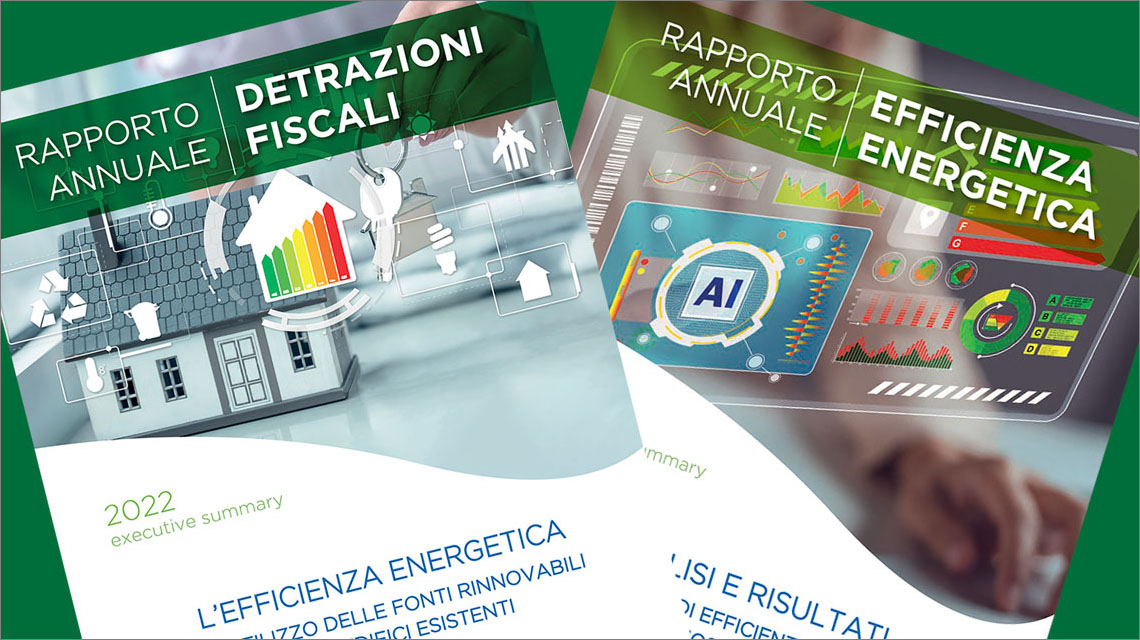Italian National Agency for New Technologies, Energy and Sustainable Economic Development

Energy: Italy, 24 billion euro investments in efficiency measures with tax deductions in 2021
Presented the Annual reports on energy efficiency and tax credits
In 2021 23.7 billion were invested as a result of tax deduction mechanisms, of which 7.5 with the eco-bonus and 16.2 with the 110% super-ecobonus. These partial data is shown in the 11th Annual Report on energy efficiency and the 13th Annual Report on tax deductions for energy saving measures and the use of renewable energy sources in existing buildings, drawn by ENEA and presented at the CNEL headquarters in Rome.
“The volatility of the energy market and the geopolitical events of the last two years have highlighted the vulnerabilities of the current energy mix and questioned energy security. In this context energy efficiency, together with renewables and renewable gases (biomethane and hydrogen), represents a key factor in accelerating the energy transition and achieving the objectives set by the Paris Agreement on climate and by the policies promoted by the EU ”, said the President of ENEA Gilberto Dialuce pointing out that “energy efficiency plays a crucial role in guaranteeing energy security both in the long and the short term, reducing the overall demand for energy and the dependence on imported oil, gas and coal".
The eco-bonus in numbers
As concerns the ecobonus, the mechanism to promote energy efficiency in end uses introduced in 2007, the ENEA report shows that the number of interventions doubled in 2021 compared to 2020, exceeding the one million threshold (1.04 million), with overall savings of 2,652 GWh/year. The majority concern more efficient heating systems (3.5 billion euro) and windows replacements (2.4 billion euro), 725 millions thermal insulation of buildings, 513 millions solar shading and 164 millions total renovation of buildings. In 2021, ENEA received over 680,000 requests for winter air conditioning system replacement, more than 210,000 for windows replacement and around 120,000 for solar shading installation.
Since its entry into force, the number of interventions incentivized by the measure has been approximately 5.5 millions with overall savings of over 21,600 GWh/year, mainly deriving from partial interventions on individual property units. In terms of investments, around 7.5 billion euro were mobilised in 2021 (+126% compared to 2020). Investments since 2007 amount to approximately 53 billions, of which 31.2 billions since 2014.
Super eco-bonus data
As concerns the 110% superecobonus, ENEA data up to 2021 show that the total number of open construction sites was 95,718, with 16.2 billion euro of eligible investments. 15% of the interventions concerned condominium buildings, 52.2% single-unit dwellings and 32.8% functionally independent units within condominiums. In terms of investments the percentages change significantly: 47.9% regard condominiums, 33.5% single-family dwellings and 32.8% functionally independent units.
According to the latest available data (as of November 30, 2022), the number of open construction sites is approximately 340,000 for a total of over 58 billion euro of investments eligible for deduction.
2030 Goals
In terms of mandatory savings, after the closure of the 2014-2020 (established by the Community Directive on Energy Efficiency) and the 2011-2020 cycle (related to the Action Plan for Energy Efficiency - PAEE 2017), Italy has started to fulfill the commitments undertaken in Europe for 2030, according to the targets set by the PNIEC. In 2021, the year in which the new monitoring course to 2030 was launched, the result was sufficiently in line with the path outlined by the PNIEC: approximately 1.1 Mtoe/year compared to the expected 1.26. This result was mainly due to the trend in tax deduction measures (0.516 Mtoe/year in 2021, against 0.33 expected), the Thermal Account (0.079 Mtoe/year against 0.07 expected) and the measures envisaged by the Transition Plan 4.0 which generated 0.07 Mtep.
"The numbers related to the deductions are encouraging in terms of the structural reduction of energy demand, also to combat energy poverty, which has increased compared to 2020", pointed out Ilaria Bertini, Head of the ENEA Energy Efficiency Department. “To obtain results - she said - we shall develop the right financial mechanisms to make energy efficiency more attractive to the entire supply chain and build a culture of change and responsibility, to promote energy behaviors which complement technology interventions”.
